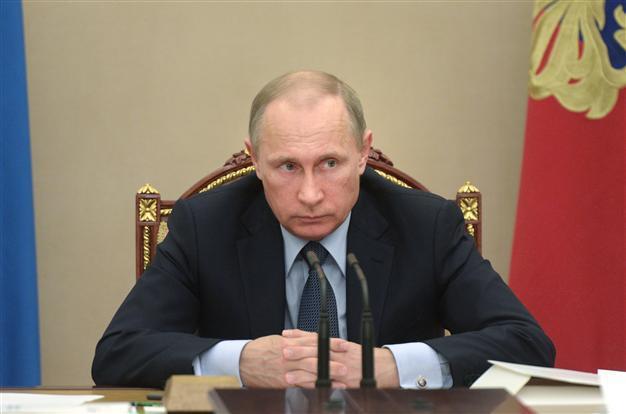EU hits out at 'arbitrary and unjustified' Russia travel blacklist
BRUSSELS - Agence France-Presse

In this Wednesday, May 27, 2015 pool photo Russian President Vladimir Putin listens during a meeting in the Kremlin, Moscow, Russia. AP Photo
The European Union hit out May 30 at a travel ban imposed by Russia on 89 European citizens -- many of whom are outspoken Kremlin critics -- calling it "totally arbitrary and unjustified".The formerly undisclosed list was revealed to European diplomats on May 28, and includes past and serving parliamentarians and ministers who have openly criticised President Vladimir Putin and the war in Ukraine.
Military figures and secret service chiefs are also thought to be on the list.
European politicians who discovered they had been banned from travelling to Russia wore the badge proudly, as Brussels took aim at Moscow for the decision.
Beyond releasing the names of the blacklisted individuals to diplomats, Moscow has failed to provide "any other information on legal basis, criteria and process of this decision," the EU's foreign service said.
"We consider this measure as totally arbitrary and unjustified, especially in the absence of any further clarification and transparency," it added.
Blacklisted politicians were nevertheless proud about being banned by Russia.
"Those who try to censor us and make us scared for standing up for values deserve even more criticism. For me it's about being very committed to standing up for peace and freedom in Ukraine," one of those banned, Swedish MEP Anna Maria Corazza Bildt, told AFP.
"I'm more proud than scared and this gives me more determination to continue... If the Kremlin takes me and my colleagues seriously it means we're doing a good job," the centre-right politician, married to Sweden's former foreign minister Carl Bildt, added.
She was among eight Swedes and several MEPs confirmed on the list, which was drawn up in response to the EU's own sanctions and travel bans on Russia citizens over Moscow's annexation of Crimea in Ukraine last year.
Former Czech foreign minister Karel Schwarzenberg, a staunch critic of Russia's policy towards Ukraine, also confirmed he was on the list and welcomed it.
"When I saw the other names (on the list), I found out I was in a very decent club. I consider this a reward," he was quoted as saying by news agency CTK.
Other names have since been made public including Guy Verhofstadt, head of the Liberal group in the European Parliament and a former Belgian PM, and Sweden's former centre-right culture minister Lena Adelsohn Liljeroth.
Nine Britons are thought to be on the list, including the head of the MI5 domestic intelligence agency, Andrew Parker, the head of the armed forces Nick Houghton, former foreign secretary Malcolm Rifkind and former deputy prime minister Nick Clegg.
"I have read the reports in the media but not a word from the Russians!" Rifkind told AFP via email as the Foreign Office said there was "absolutely no justification for this list"
According to German daily Bild seven German nationals have been targeted including Michael Fuchs, vice-president of the national parliament's conservative CDU-CSU group and Franco-German former MEP Daniel Cohn-Bendit.
The German government also complained about the secrecy surrounding the measures and said it expected Russia to publish the list along with an explanation of how to contest it legally.
"At a time when we are trying to defuse a bitter and dangerous conflict in the heart of Europe, this does not help," German Foreign Minister Frank-Walter Steinmeier said in a statement during a visit to Ukraine.
Polish media reports suggest that as many as 18 Poles have been targeted, including Deputy Minister of National Defence Robert Kupiecki and the Senate Speaker Bogdan Borusewicz.
Borusewicz is a key Communist-era dissident who was denied entry to Russia in March to attend the funeral of outspoken opposition activist Boris Nemtsov who was shot dead in central Moscow.
Dutch Prime Minister Mark Rutte was the first to reveal that a list of blacklisted figures had been shared with European diplomats.
He said May 29 that he would let "Moscow know... in no uncertain terms" that the Netherlands rejected it as the bans were "not based on international law".
Western governments have suspected the existence of a list for some time and several prominent politicians and officials have been stopped from entering Russia in recent months.
Finland's new Foreign Minister Timo Soini commented in a blog post on the inclusion of Finland's only known name on the list -- Green Party MEP Hiedi Hautala -- and said it was "not a big surprise".
"This is an expected reaction to the (EU) travel ban against Russian citizens."
His Swedish counterpart took another view.
"It is very striking behaviour which unfortunately does not improve Russia's image and we have asked for a clarification for this conduct," Swedish Foreign Minister Margot Wallstroem told news agency TT on May 29.
















